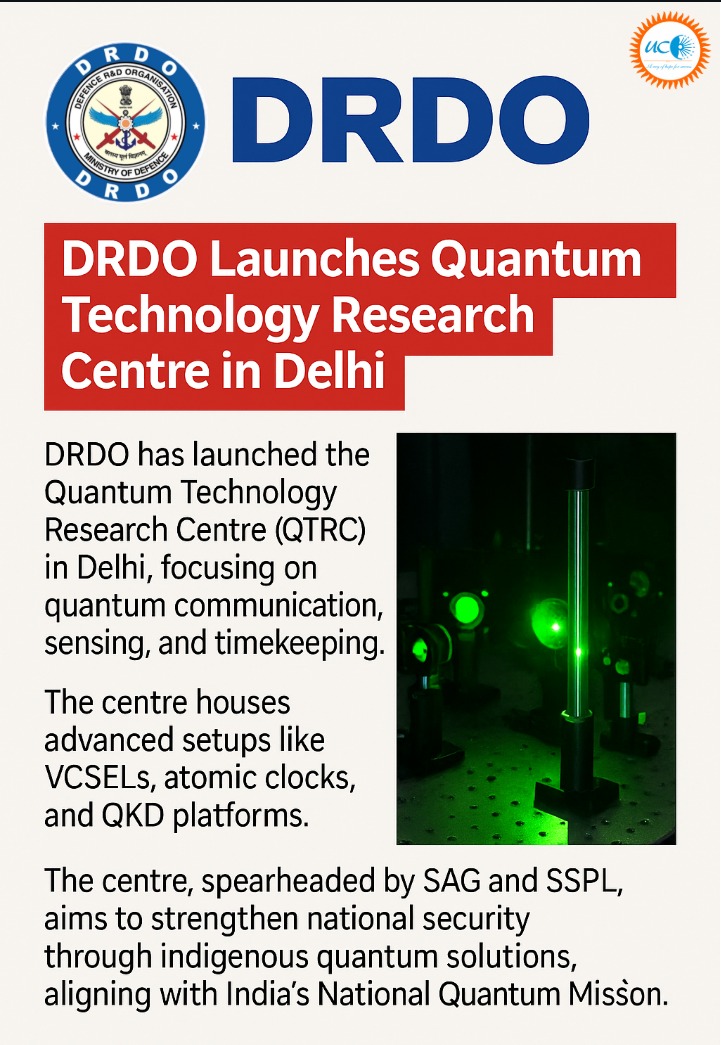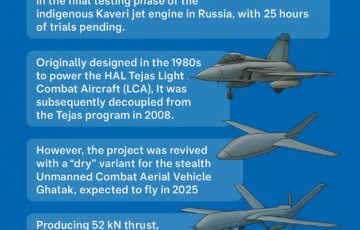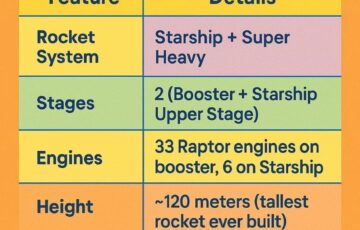DRDO Inaugurates Quantum Technology Research Centre in Delhi
DRDO Inaugurates Quantum Technology Research Centre in Delhi: A Strategic Leap for India’s Quantum Mission
In a landmark development for India’s defence and strategic innovation, the Defence Research and Development Organisation (DRDO) inaugurated the Quantum Technology Research Centre (QTRC) on May 27, 2025, at Metcalfe House, New Delhi. This state-of-the-art facility, a key component of India’s quantum mission, was formally unveiled by Dr. Samir V. Kamat, Secretary of the Department of Defence R&D and Chairman of DRDO, in the presence of senior dignitaries, including Smt. Suma Varughese, Director General of Micro Electronic Devices, Computational Systems & Cyber Systems. The establishment of QTRC marks a significant milestone in India’s quantum computing journey, showcasing the country’s commitment to advancing quantum technology and bolstering India quantum computing initiatives.
This dedicated centre aims to spearhead indigenous quantum capabilities in quantum science and technology, a critical area that is increasingly shaping the future of national security, communication, and intelligence worldwide. QTRC will serve as a central hub for research and development in quantum communication, sensing, cryptography, and timekeeping—areas considered essential in modern warfare and cyber resilience. The establishment of QTRC underscores India’s commitment to quantum technology and its applications in defense and strategic sectors, marking a significant step forward in the National Quantum Mission that India has embarked upon, as highlighted in the national quantum mission PIB releases.
Key Focus Areas of QTRC
The centre is equipped with cutting-edge experimental infrastructure to develop and test several high-priority quantum technologies across various quantum domains:
Quantum Key Distribution (QKD): Led by the Scientific Analysis Group (SAG) of DRDO, QKD will enable ultra-secure communication using quantum entanglement and single-photon sources. This is vital in building quantum-secured communication systems resistant to quantum-era cybersecurity threats and establishing a quantum-safe ecosystem.
Laser Characterization Setups: The centre includes tools for analyzing Vertical-Cavity Surface-Emitting Lasers (VCSELs) and Distributed Feedback Lasers, which are crucial components in quantum communication and quantum sensing technologies.
Single-Photon Source Testing: Facilities have been established to test and validate single-photon emission sources, a foundational requirement for quantum optics and secure data transmission in quantum networks.
Atomic Clock Development: QTRC is working on ultra-small atomic clocks based on Coherent Population Trapping (CPT), which ensure precision timekeeping independent of satellite-based systems—critical for secure military navigation and synchronization.
Magnetic Field Detection: Using optically pumped magnetometry, atomic magnetometers will enable highly sensitive magnetic field measurements, beneficial for submarine detection and advanced surveillance. This quantum sensing & metrology technology represents a significant advancement in strategic applications. The development of atomic magnetometers at QTRC showcases India’s progress in quantum technology, with these devices playing a crucial role in enhancing the country’s defense capabilities. The atomic magnetometer technology being developed at QTRC is expected to revolutionize magnetic field detection in various defense and civilian applications.
Solid-State Quantum Devices: The centre is also exploring advanced quantum materials and devices that could power next-generation defense platforms and quantum-resilient encryption networks, including the development of quantum-safe symmetric key systems and quantum-safe asymmetric key algorithms. This research is closely tied to the development of quantum computers in India, positioning the country at the forefront of quantum computing advancements.
National Quantum Mission and Strategic Vision
The establishment of QTRC is a part of India’s broader push under the National Quantum Mission, which aims to develop sovereign capabilities in emerging technologies. It underlines the nation’s commitment to reduce dependency on foreign technologies and assert leadership in Asia’s quantum landscape. The quantum mission India has undertaken emphasizes the development of quantum computing and other quantum technologies, with a strong focus on advancing India quantum computing capabilities.
DRDO has already demonstrated its growing strength in this field with successful quantum communication trials across 100 kilometers in collaboration with IIT Delhi—a testament to the country’s accelerating momentum in applied quantum research and technical communication quantum advancements. This progress is crucial for India’s quantum computing efforts and positions the country as a significant player in the global quantum technology arena. The importance of this field is reflected in its inclusion in various competitive exams, with quantum computing UPSC topics becoming increasingly relevant for aspiring civil servants and policymakers.
A Step Towards Technological Sovereignty
As nations globally race to dominate the quantum domain, India’s QTRC represents a timely and strategic intervention. With growing concerns over cyber warfare, satellite vulnerability, and data security, the ability to develop homegrown quantum technologies is not just a scientific ambition but a geopolitical necessity.
The centre’s launch reflects India’s long-term vision to become a technologically self-reliant power, capable of defending its digital borders and contributing to global quantum research. The QTRC will serve as one of the key T-Hubs (Thematic Hubs) under the National Quantum Mission, fostering quantum innovation and collaboration across various institutions in India. These T-Hubs are designed to accelerate quantum technology development by bringing together academia, industry, and government resources, further solidifying the foundation for quantum computing in India.
In conclusion, the DRDO’s Quantum Technology Research Centre is a strategic asset that will significantly shape India’s defence and secure infrastructure in an uncertain world. It marks a crucial step in India’s quantum journey, addressing the question of whether India has quantum computers. For those wondering “does India have quantum computer,” the QTRC’s establishment is a clear indication of the country’s progress in this field, with quantum computer in India becoming a reality.
The centre’s work on quantum-safe symmetric keys and post-quantum cryptography will be vital for ensuring India’s preparedness in the face of future quantum threats. This makes quantum technology India an essential topic for UPSC (Union Public Service Commission) aspirants and policymakers alike, with quantum computer UPSC and quantum communication UPSC becoming increasingly relevant subjects in strategic studies.
As India continues to advance its National Quantum Mission, the QTRC stands as a testament to the country’s commitment to becoming a leader in quantum computing and related technologies. The establishment of QTRC directly addresses the question, “Does India have quantum computer?” While full-scale quantum computers are still in development, India is making significant strides in quantum computing research and development. The QTRC’s focus on quantum computer in India demonstrates the country’s dedication to this cutting-edge field, positioning India as a key player in the global quantum technology landscape and accelerating the progress of India quantum computing initiatives.
QTRC will serve as one of the key T-Hubs (Thematic Hubs) under the National Quantum Mission, fostering quantum innovation and collaboration across various institutions in India. These T-Hubs are designed to accelerate quantum technology development by bringing together academia, industry, and government resources, further solidifying the foundation for quantum computing in India.
In conclusion, the DRDO’s Quantum Technology Research Centre is a strategic asset that will significantly shape India’s defence and secure infrastructure in an uncertain world. It marks a crucial step in India’s quantum journey, addressing the question of whether India has quantum computers. For those wondering “does India have quantum computer,” the QTRC’s establishment is a clear indication of the country’s progress in this field, with quantum computer in India becoming a reality.
The centre’s work on quantum-safe symmetric keys and post-quantum cryptography will be vital













